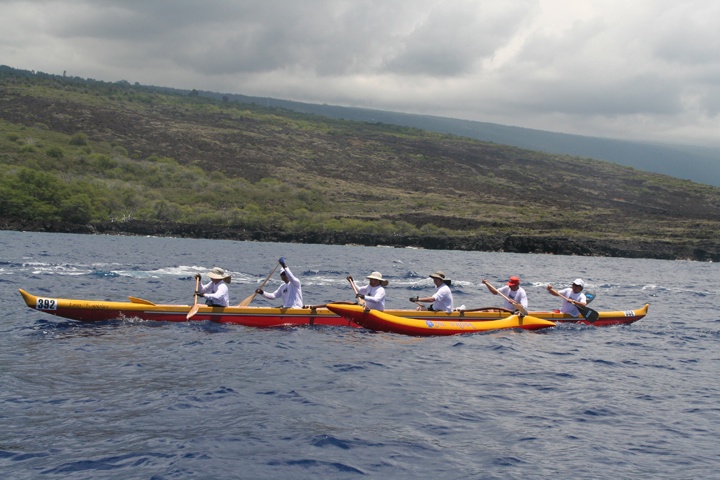The mission of Makapo is to help people with disabilities live active lives through inclusive outrigger paddling programs.

Finishing last in a race can sometimes lead to an experience more satisfying than winning.
Makapo Aquatics executive director RJ De Rama discovered this back in 2006, a year after going legally blind as a result of retinal blastoma. While attending the Braille Institute in Anaheim, California, De Rama was invited to compete in an 18-mile canoe race in Hawaii.
The Southern California native accepted. He and four other blind individuals formed a crew along with a sighted guide. They finished in last place but became the first blind crew to complete the race.
The six-man team earned respect from those who initially expressed skepticism that blind individuals could compete. They also gained something else: a bond that continues to this day. The steersman, Billy Whitford, happened to be the executive director of the National Aquatic Center (NAC). Whitford was a world-renowned outrigger paddling coach, something the other crew members didn’t know at the time.
“He was humble and gracious enough to spend three hours of his life and come in dead last for the first time,” recalled the 46-year-old De Rama, who obtained a BS degree in biological sciences from the University of California, Irvine and a teaching certificate from Chapman University. “But he said it was the best dead-last finish of his whole life.”
The experience planted the seed of an idea that grew into Makapo Aquatics a year later. Maka is the Hawaiian word for eye, and po means darkness. Put together, the word Makapo is the definition of being blind.
De Rama realized other blind individuals could benefit from outrigger paddling.
“A lot of people were definitely impressed by what we did. We knew the impact we had on other people in the paddling community, and we saw how accepting they were. The crew decided to form a nonprofit out of this.”
Initially, the organization formed around the five blind crew members and competed in outrigger races throughout Southern California and Hawaii. In 2014, De Rama and his wife Rita adopted a son, Timothy, who inspired De Rama to expand Makapo to include other disability groups.
“That started in 2016 when my wife and I learned our son, whom we had adopted two years prior, had Cerebral Palsy. We (decided to) open this blessing we have to families affected by other things.”
The mission of Makapo is to help people with disabilities live active lives through inclusive outrigger paddling programs. A partnership with NAC has allowed the group to offer programs for beginners and advanced racers.
“We’ve helped people as young as three all the way up to age 96. Our goal is to get blind and visually impaired people on the water (and) if they like it, provide for them a growth opportunity from recreational to competitive.”
The biggest challenge Makapo faced in its early stages was getting to and from races. But as the organization grew, friends and family members of the participants came along and volunteered.
“Everyone who paddles with us has to travel pretty far. Back then, it was about trying to carve out time to devote to this activity. We knew that hurdle would translate to other people that we would bring into the mix.”
The introductory adult paddling program, known as Ohana Days, instructs individuals in the basics of outrigger paddling and allows them to connect with other members of the community. If they express a desire to advance their skills, they can move to a competitive racing team.
Kids are also introduced to the sport and trained to compete in races. Programs usually run up to three times a week for competitive teams. Adult programs cost $20, the kids’ program $10.
“We try and keep the cost as low as we can. It includes everything.”
Teams compete in six-mile races sanctioned by the Southern California Outrigger Racing Association (SCORA). Six races are held in May and June featuring the traditional crew of five blind paddlers and a sighted steersman. Makapo teams occasionally enter 12-mile races depending on a team’s ability level.
In the past, Makapo has participated in nine-man relay races. Each six-man team is augmented with an additional three members who follow along in a chase boat and change out every 15 minutes as the canoe glides by.
“Those races tend to be a lot longer. We were able to do that in 2013 and 2014 when we had a really large group. We’re trying to rebuild to that.”
De Rama learned about the Foreseeable Future Foundation through Kevin Fuhrman, former development director of Beyond Blindness. Makapo received a grant that will go toward developing a special remote-control system for one-person canoes. De Rama first came up with the idea in 2018 and teamed up with a researcher at UCI to build the technology.
“Since 2018, we’ve been using it for training and for races. The money will be used to help purchase a canoe and the parts to make another system for our team.”
As thrilled as he was to receive the grant, De Rama was also humbled.
“Obviously it felt good and I felt honored. But for me, this was special in that it was an organic process. Foreseeable Future is trying to help any way they can by not only providing programs but money to other programs. That connection and fruition of getting a grant affirmed to me that there are people out there who want to help.”
To find out more about Makapo or to sign up for one of its programs, visit their website.
